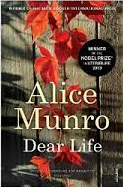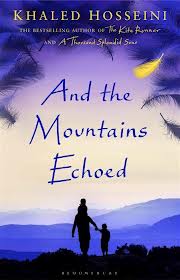Latest Event Updates
Gang leader for a day by Sudhir Venkatesh: Author’s overdeveloped curiosity and underdeveloped sense of fear opens up a different world for us.
I had read about Sudhir Venkatesh’s research of the drug dealer network in Freakonomics some years ago and I was curious to read the whole story. 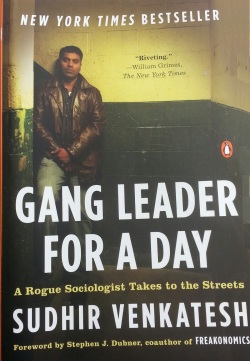 This book satisfies that curiosity and opens up the world of Chicago’s housing projects that had drug and crime running in its veins. It is well known that every society has an underbelly ridden with crime but what is perhaps not known is the professionalism of the modern crime world. A gang leader with a college degree, ranking and discipline among its soldiers, modus operandi of the deals – the crime world’s disturbing yet fascinating tale is experienced and then told by the author in an interesting manner.
This book satisfies that curiosity and opens up the world of Chicago’s housing projects that had drug and crime running in its veins. It is well known that every society has an underbelly ridden with crime but what is perhaps not known is the professionalism of the modern crime world. A gang leader with a college degree, ranking and discipline among its soldiers, modus operandi of the deals – the crime world’s disturbing yet fascinating tale is experienced and then told by the author in an interesting manner.
The book starts of well and holds the reader’s interest most of the time. The author’s confusion about separating research and personal involvement in the subjects, leads to a somewhat lack luster end.
My recommendation? Do read the book.
Still Alice: Touchingly true portrayal of life with Alzheimer by Lisa Genova
Alice is an intelligent highly accomplished cognitive psychology Harvard professor, a mother and a wife. She is enjoying great health at the age of around fifty and yet she starts forgetting words, places, and people. 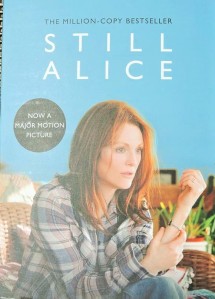 Written from the perspective of an Alzheimer patient, the book is very readable. The drama of Alice’s life is touching and disturbingly true. It depicts how her memory starts regressing and how it alienates her from the rest of the world. All the characters and situations in the book appear to be real. The discussion of the disease, the treatment, the gene that can lead to an early onset of Alzheimer; all details come naturally in the story. At no point the book deviates from its form of a novel. Alice’s struggle to cope with her life when her memory is fading is as readable as the story of those around her. I think this wholesome approach is what gives the book a major plus. I like the title of the book as well as it sums up Alice’s condition very well.
Written from the perspective of an Alzheimer patient, the book is very readable. The drama of Alice’s life is touching and disturbingly true. It depicts how her memory starts regressing and how it alienates her from the rest of the world. All the characters and situations in the book appear to be real. The discussion of the disease, the treatment, the gene that can lead to an early onset of Alzheimer; all details come naturally in the story. At no point the book deviates from its form of a novel. Alice’s struggle to cope with her life when her memory is fading is as readable as the story of those around her. I think this wholesome approach is what gives the book a major plus. I like the title of the book as well as it sums up Alice’s condition very well.
I did not see the movie because I always think books are better than movies. In this case particularly, the prose that describes the workings of the mind beautifully is difficult to put in action.
I would love to hear from those who have read the book and have also seen the movie.
The Book Thief: Gem of a book by Markus Zusak
I had this book at home for some years, bought by my daughter and I remember making an attempt to read it. I was not really taken up by Death, talking about what was the color of the day and how the cold day was treating a small girl and her dying little brother. 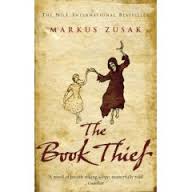 I kept the book down after the first few pages. Later I read many reviewers raving about the book and when the book was selected by the book club, I picked it up again and what a gem it turned out to be!
I kept the book down after the first few pages. Later I read many reviewers raving about the book and when the book was selected by the book club, I picked it up again and what a gem it turned out to be!
Yes, if you get past the oddity of Death as a narrator who at times runs ahead of himself telling you what happens in the future and then brings you back to the present, then the story that unfolds is rather touching.
The story of a little thin girl Liesel, living with her foster parents in the small German village of Molching during the Second World War, is captivating. The relationships that Liesel forms during this period, with elders and kids around her; how she learns to read, write and develops a lifelong love of books forms the core of the story. The backdrop of a raging WWII, scarcity of money, food and general hardships makes the story of human relationships appealing.
Little frail girls make really hardy and unforgettable heroines: be it Francie Nolan in A Tree grows in Brooklyn, Loung Ung in First they killed my father or Niamh in Orphan Train – They all could not have been different yet the same!
I’m recommending Book Thief to all readers. The story of a small girl whose initiation in the world of letters through a very unusual book called The grave digger’s handbook will stay with the reader for a long time.
The Swallows of Kabul by Yasmina Khadra: Cruel reality of everyday life in Afghanistan
How would everyday life look like when an entire country has lost its freedom to fundamentalists? If this is a question one has, then ’The swallows of Kabul’ offers the answer. 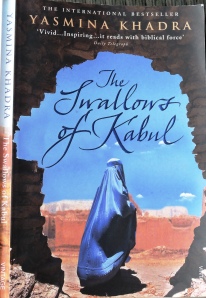 The answer as expected is not at all pretty. In fact it is downright depressing. The life of people in this dusty, broken down country has slowly and surely become inhuman. The book starts with the public stoning of a woman accused of being a prostitute. It ends with another public stoning. In between these two incidences are the snippets of ordinary life of jailor Atiq Shaukat, his ailing wife Mussarat, young but helpless Mohsen and his beautiful and feisty wife Zunaira. I found reading this book akin to a journey in a train that passes through a barren, burnt, dark country side where a sense of utter hopeless prevails. The surrounding mountains seemed to stop any joy from entering this country side.
The answer as expected is not at all pretty. In fact it is downright depressing. The life of people in this dusty, broken down country has slowly and surely become inhuman. The book starts with the public stoning of a woman accused of being a prostitute. It ends with another public stoning. In between these two incidences are the snippets of ordinary life of jailor Atiq Shaukat, his ailing wife Mussarat, young but helpless Mohsen and his beautiful and feisty wife Zunaira. I found reading this book akin to a journey in a train that passes through a barren, burnt, dark country side where a sense of utter hopeless prevails. The surrounding mountains seemed to stop any joy from entering this country side.
I know that this is a reality of life for ordinary people in Afghanistan today but I still longed for some delicate moments and occasional green shoots of hope. None are present in the book.
So is this book worth reading? Yes, it is. Am I recommending it? I’m not, simply because I found it depressing. This book is translated from French to English. The cover of the book mentions the Daily Telegraph review as ‘Vivid…Inspiring…it reads with biblical force’ and I partly agree. It is vivid- uncomfortably so; but not inspiring.
Mom and me and mom by Maya Angelou: Selective Memoir that is too selective; fails to make a cohesive tale
This last book of Maya Angelou’s was my first book by her as a reader. Due to this somewhat unusual sequence, I thought the book was incomplete and rather too selective in terms of events that are described here. 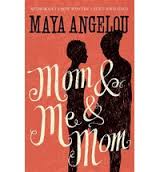
The book portrays Maya’ mother, Vivien Dexter as a mother who realized that she was not ready for small children, Maya, aged 3 and her brother Bailey, aged 5. So she sent them away to her mother-in-law, their grandmother. The children, though well loved by the grandmother, felt abandoned by the mother. It is not clear from the book if the mother called them back out of love or whether the grandmother’s fear of fifteen year old Bailey getting lynched for coming in the way of white people around. It is such lack of clarity that makes the book feel incomplete and the story disjointed.
The mom in this book is ‘lady’, who is full of life and love for her children. The daughter makes choices that might set her on a doomed path forever but her mother’s love teaches her to be strong and being proud of who she is. I read that Michele Obama, in her eulogy to Maya Angelou spoke of how Maya Angelou inspired and affirmed her as a black woman growing up in America. I could sense that inspiration from Maya Angelou’s life and it owed a lot to her mother, brother and grandmother’s love for her.
Love heals is the theme of the book and in the author’s life that saw her becoming a singer, stage artist, script writer, poet, writer and college professor as well as financially very successful. The author’s and her mother’s life have been interesting, full of hope and achievements but this book is rather selective in the narrative and does not leave one fully satisfied. The writing style is light and humorous and that makes it an easy book to read. As mentioned before, this is the last book by the author and may not be her best so I would like to recommend the author more than the book.
First they killed my father, a daughter of Cambodia remembers: heart wrenching story
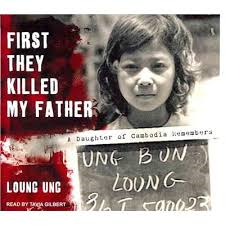 The story starts in Phnom Penh of mid-seventies with little Loung Ung and her large family of 9 people – parents and 7 siblings leading a cushy and comfortable life. Loung tells the story with flourish that makes the noises, food, smells, comings and goings of this Cambodian capital and that of the family, vivid to the reader. And then one fine day in the month of April in 1975 the story changes and how! Their family, along with all other families in the city, is ordered to leave the city immediately. The elders scramble together all their belongings that they could carry and begin the death march. Five year old Loung is too young to understand what is happening but because her Papa is with her, she knows she will be taken care of. Thus starts the grueling exodus that is one of the cruelest in the recent human history. Loung describes the ordeal through her eyes and I found my throat tightening when she described how her eight year old brother Kim suffered beating and thrashing just so that he could get left over food for the family. I had to stop at times, compose myself and then start reading the next day as I just could not take in what was happening in the book. To imagine that Loung and others lived through this life for four years is incredible and I salute them for braving extreme hardships. These four years saw death of Loung’s elder sister and that of her baby sister through continuous malnourishment. Her father and later her mother were killed by the Khmer Rouge regime of Pol Pot. Loung was forced to stay at a work camp for orphans where she trained as a child soldier. She, along with her remaining siblings survived through labor camps, hunger, sickness, violence and attempted rape. The strong family ties saw them survive and slowly come back to civilized life. This is a chilling true story though Loung must have recreated the events while writing with the help of her siblings as she was just a five year old girl when the exodus began. She is gifted with a strong memory and was a precocious child with a strong fighting spirit who remains hopeful despite the brutal reality around her. Genocides are the darkest chapters in human history and yet just 40 years ago the calm and quite Cambodia lived through one of the worst genocides. For someone like me who did not know the details, this book made a compelling reading. Some readers may not like to read about pain and cruelty, but I, for sure would like to recommend this book to all who like to know about the history and life of people who braved the worst. The more we read these stories the greater is our awareness about such happenings and for this reason alone, Loung’s heart wrenching story needs to be read by all of us.
The story starts in Phnom Penh of mid-seventies with little Loung Ung and her large family of 9 people – parents and 7 siblings leading a cushy and comfortable life. Loung tells the story with flourish that makes the noises, food, smells, comings and goings of this Cambodian capital and that of the family, vivid to the reader. And then one fine day in the month of April in 1975 the story changes and how! Their family, along with all other families in the city, is ordered to leave the city immediately. The elders scramble together all their belongings that they could carry and begin the death march. Five year old Loung is too young to understand what is happening but because her Papa is with her, she knows she will be taken care of. Thus starts the grueling exodus that is one of the cruelest in the recent human history. Loung describes the ordeal through her eyes and I found my throat tightening when she described how her eight year old brother Kim suffered beating and thrashing just so that he could get left over food for the family. I had to stop at times, compose myself and then start reading the next day as I just could not take in what was happening in the book. To imagine that Loung and others lived through this life for four years is incredible and I salute them for braving extreme hardships. These four years saw death of Loung’s elder sister and that of her baby sister through continuous malnourishment. Her father and later her mother were killed by the Khmer Rouge regime of Pol Pot. Loung was forced to stay at a work camp for orphans where she trained as a child soldier. She, along with her remaining siblings survived through labor camps, hunger, sickness, violence and attempted rape. The strong family ties saw them survive and slowly come back to civilized life. This is a chilling true story though Loung must have recreated the events while writing with the help of her siblings as she was just a five year old girl when the exodus began. She is gifted with a strong memory and was a precocious child with a strong fighting spirit who remains hopeful despite the brutal reality around her. Genocides are the darkest chapters in human history and yet just 40 years ago the calm and quite Cambodia lived through one of the worst genocides. For someone like me who did not know the details, this book made a compelling reading. Some readers may not like to read about pain and cruelty, but I, for sure would like to recommend this book to all who like to know about the history and life of people who braved the worst. The more we read these stories the greater is our awareness about such happenings and for this reason alone, Loung’s heart wrenching story needs to be read by all of us.
Day after night by Anita Diamont: Well written yet I failed to connect with the story
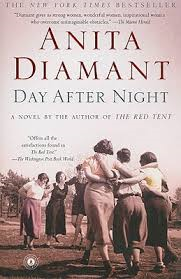 Second World War dominated the history of wars in the 20th century and had a huge impact on the world. Now it is almost 70 years since then and yet movies (Monument men) and books(Unbroken) get released about the war times.
Second World War dominated the history of wars in the 20th century and had a huge impact on the world. Now it is almost 70 years since then and yet movies (Monument men) and books(Unbroken) get released about the war times.
‘Day after night’ is set at the very end of WW2, in an Israeli camp at Atlit where Jews without paper identities await their future. There is no threat of death in this camp that is governed by the British command. Food, clothing and shelter is provided. Five young girls, few still in their teens, from different parts of Europe find themselves at this camp. They all have lost family, friends, fortune and the sense of smell! Their future is uncertain yet they try and make something out of the days that stretch ahead of them.
I found it difficult to connect with the characters in this book. The characters are well developed but do not leave a long lasting impact on the reader’s mind. I also felt that in order to have a mix of characters that represented Europe of those times, the author picked up Shayndel from Poland, the beauty Leonie from Paris, a tall Dutch Tedi and German Zorah who survived Auschwitz. The stories of these girls are not intertwined and because there is no imminent death threat, the books fails to reach a nail biting climax when everyone escapes to a nearby Kibbutz.
I think if you have a personal connection to Jewish families, to Israel or to the World War 2, then this would be an interesting book. I don’t have any of these connections so I could not get immersed in the story of the book.
Coming to the strengths of the book, let me hasten to add that Anita Diamont, the author writes very well and has the power to bring the camp alive for the readers. I could picture the barbed fenced camp with hot humid air and the ongoing life of the people held in the camp. Sadly the people in the camp did not become fully alive through the pages of the book, to stay in the reader’s mind for a long time.
Recommendation for the book? I’m non-committal. The book has got great reviews from many readers and I can understand that; but I’m not joining those readers.
Lowland by Jhumpa Lahiri: Falls short of expectation on multiple counts
Jhuma Lahiri writes wonderfully well. She can create pictures with words and her characters always come alive in her books. The Kolkata house where Subhas and Udayan grew up and the lowland in front of the house that flooded in the rains appeared in front of my eyes as I started reading the first few pages of the book. The two brothers with their different temperaments, one pushing the boundaries and other very cautious also got characterized well 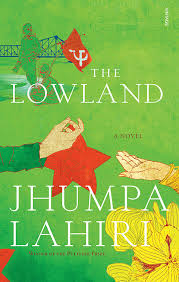 and then……..
and then……..
Now let me explain why I say Lowland falls short; that too on many counts. Good characterization, great atmosphere creation for Kolkota of the 70s but where is the plot in Lowland? The plot disappears after the first few chapters when the story moves to America with Udayan. I got the same feeling about the Naxalbari movement description. It was dealt without depth, almost like reciting from pages of history books and was given cursory treatment. The Naxalbari movement is very small part of the book anyway and the author seems out of depth describing it.
It is said that fiction is deeply rooted in real life experiences and authors can write about something genuinely only if they have experienced it. Great authors overcome this by creating imaginary worlds and the world loves J K Rowlings and Harry Potter because of that. Jhumpa Lahiri is however stuck with Kolkota and US East Coast university towns where educated Bengali diaspora feel a tussle of Indian upbringing on American soil. In all her books this is the recurring theme and I for one have had enough of it!
Of the characters, Gauri comes out as a very un-motherly, unthankful person and I could not identify with her at all. Subhash dies quickly in the book and the ideology he was driven with, remains unconvincing. Udayan seems to accept things as they come without much passion. Not that all books need a hero but when all characters are unlikeable so becomes the book. As a whole the book remains unsatisfying.
So to end, my take on the book is that, Lowland is well written but an unimpressive book.
And the mountains echoed: engrossing story from the master story teller
Khaled Husseini
For some time now I have longed to read a story that has a good old fashioned story telling style – A simple narration of life of ordinary people and their interaction with mountains, seasons, trees, birds and beasts. Khaled Husseini’s book starts with one such beautiful story told by a father to his 10 year old son and 3 year old daughter.
The story sets the stage for what is to happen in the life of this small family in a small Afghan village. The novel is a wonderfully told bitter sweet story of love that is tested by the harsh realities of life. It gripped me right from the start.
The author is a master story teller and knows how to bring all his characters alive. Not only the people but also a hundred year old oak tree and a dog called Shuja become real characters in the story. A hard working father Saboor, loving brother Abdullah, his young sister Pari, twin sisters Parwana and Mastana , driver Nabi, rebellious poet Nila and her introvert husband Suleiman, all become alive through the story. The story moves from a small village of Shadbagh to Kabul; from poverty, cold and hardships to luxury, parties and complex relationships. The era comes alive and the reader is transported to Afghan life.
..And then the story loses focus. It takes us along with Nila and Pari to Paris, with Markos to the Greek island of Tinos, along with Idris to America and with Iqbal and Ghulam back to a completely changed Shahbad. As a reader I still lingered in earlier Shahbad and Kabul. Even though these later locales and the characters inhibiting them do take the story ahead, somewhere a feeling of losing focus and going all over the place sets in. This unfortunately also becomes a shortcoming of the book.
I think the end too lets the reader down. The much anticipated brother-sister meeting does take place but by then a lot of water has flown under the bridge and the emotional connect has been lost. The lives in the Western world appear to be uninteresting and mundane. What starts as a gripping story, ends into a sort of lost cause.
Even with these two shortcomings, I’m still recommending this book to all the readers. It will live with you for a long time and Afghanistan with its mountains, seasons and people will make you long for a visit.
Here is the poem by William Blake that gives the book its name (hills change to mountains)
When the voices of children are heard on the green
And laughing is heard on the hill,
My heart is at rest within my breast
And every thing else is still
Then come home my children, the sun is gone down
And the dews of night arise
Come come leave off play, and let us away
Till the morning appears in the skies
No no let us play, for it is yet day
And we cannot go to sleep
Besides in the sky, the little birds fly
And the hills are all cover’d with sheep
Well well go & play till the light fades away
And then go home to bed
The little ones leaped & shouted & laugh’d
And all the hills echoed.

